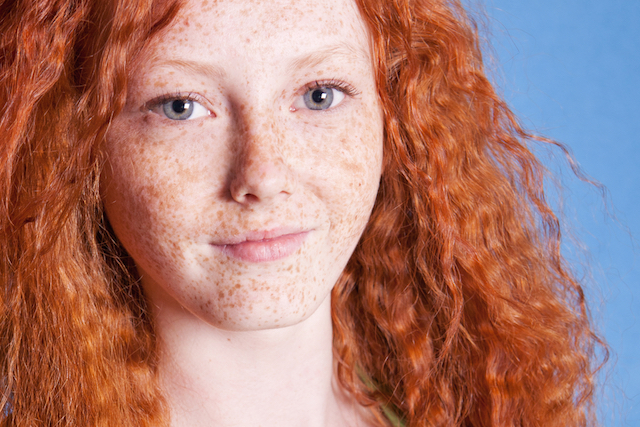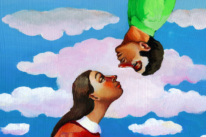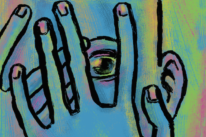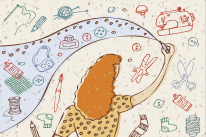
“I follow four dictates: face it, accept it, deal with it, then let it go.” ~Sheng Yen
Growing up different isn’t easy for anyone.
I was born normal, happy, and healthy. I had five fingers and five toes. I reached all my developmental milestones and showed promise as a vivacious, energetic child. It all changed when I was ten months old.
I became violently ill with bacterial meningitis. I battled the infection with a strength I was naturally graced with at birth. One week into my hospital stay, I was finally able to lift my head; two weeks later, I was back home.
I was lucky to escape with my life from the meningitis. When it’s not fatal, it can result in long-term complications, such as low IQ, cognitive impairment, loss of limbs, and learning difficulties, to name a few.
I came away with profound hearing loss. Not quite deaf, but enough loss to have it impact on my daily functioning.
At seven years of age, I got my first pair of hearing aids. It opened my world to a whole new experience. I could hear a lot more and I have this vivid memory of hearing a leaf scatter across the pavement for the first time. I couldn’t for the life of me figure out what that noise was.
It brought challenges along with it too.
I was known as the kid with “the things in her ears.” I was bullied for being different. I hung out with the boys playing football and cricket because the girls didn’t want a bar of me.
It left me emotionally dead. I was really good at burying all the pain inside and trudging along every day.
I became a master robot—a mechanical human being incapable of trusting and feeling. It was my survival mechanism doing its best to avoid accepting who I really am.
Entering the real world after school became a shock. Out of my comfort zone, I had to enter a world of large groups, noisy parties where I couldn’t hear what anyone was saying, large lecture rooms, and meeting new people. I had to suddenly be more than okay with my hearing loss.
I had to be okay with being a little different.
It was the biggest lesson of my life—my own perceived fears are far more powerful than anything else.
I perceived people would treat me different or look at me differently if I told them I had hearing loss. By believing this, I practically encouraged them to treat me differently without realizing it.
So there I was, in my late teens, brewing with years of buried emotions and a confronting new reality of accepting who I am. So what did I do? Partied hard of course. The emotions came out in a flurry of binge drinking and hangovers worthy of a death bed.
It took me three years to finally wake up. Three years to finally realize that I must accept every part of me in order to live the life I want. Negative emotions continue to build up when we cannot accept ourselves for who we really are, and burying our emotions is no different to avoiding our true self.
Accepting who we are is a beautiful, bone-achingly hard thing to do. It’s about being vulnerable, consciously opening our eyes to our flaws, and seeing them in a whole new light. It hurts at first, but it’s a pain worth a thousand lifetimes.
By changing our perception to see our flaws as neutral traits that are both good and bad, we change how we choose to react to things. It will ultimately change our life for the better.
I’ve learned to see the benefits of my hearing loss. I’m a world-class lip reader who can probably “hear” better than you in loud settings. I’m more visually aware and observant than most, which has been incredibly handy in understanding human behavior.
I had to face my hearing loss through accepting it as a genuine, unique part of me. I am absolutely in love with my life, despite all its challenges and pitfalls, and I have no doubt that if I didn’t have this unique part of me, I would be in a very, very different place.
If I could give you five tips to help you accept who you are, they would be this:
1. See your perceived flaws in a whole new light.
Nothing is ever completely good or completely bad. In fact, everything is in perfect, harmonious balance. Find the benefit of that one thing you have trouble accepting, and change your perception to see that it’s not so bad having it after all.
2. Practice gratitude daily.
We all have so much to be grateful for. Gratitude helps to cultivate a positive mindset, which will help you to accept yourself for who you really are.
Create a daily gratitude journal and list three things for which you are grateful. Do this in the morning to start your day on a positive note.
3. Recognize that you are not your thoughts.
We get so lost in the story that goes through our minds. Our egoistic mind is, in fact, our greatest storyteller. And too often, we believe everything it tells us.
Learn to recognize that thoughts are created by an egoistic, survival-focused mind. It sees the threat in everything. Start to separate yourself by asking your mind this: “Does this thought serve me and my purpose? Does this thought actually help me?”
4. Be vulnerable with others.
You will be pleasantly surprised to know that you are not alone in this big, beautiful world. Someone out there has gone through your tribulations and trials, and they will understand what you are going through.
We can feel so alone with our ego at times, so sharing with others can help us to see the light at the end of the tunnel. It also helps us to change our perception, as others can guide us to a different angle.
5. Look after yourself.
Eat a nourishing diet, move regularly, rest often, and be mindful. We, too often, underestimate how the mind and body work both ways. By looking after your body, you are creating a sacred environment for your true being. It makes acceptance a lot easier when you look after the house your soul resides in.
It wasn’t until I started applying these five tips that I finally began the arduous process of accepting every little part of me, including that ever so tough one of my hearing loss. Every day, I accept myself a little more.
I just want you to remember this: you are imperfectly perfect, just the way you are.
Photo by g-imagination
About Kate Taholka
Kate Toholka is a Health & Life coach, author and speaker. She helps people to have a healthier, harmonious relationship with their mind, body and soul. You’re invited to read more about Kate and read the blog to be inspired to become the best version of you.













 Though I run this site, it is not mine. It's ours. It's not about me. It's about us. Your stories and your wisdom are just as meaningful as mine.
Though I run this site, it is not mine. It's ours. It's not about me. It's about us. Your stories and your wisdom are just as meaningful as mine.
So true! Great article,thanks!
Thanks Alison!
“By changing our perception to see our flaws as neutral traits
that are both good and bad, we change how we choose to react to things.” In this passage you mention that changing our
perception to accept ourselves as who we are is amazing; however, I don’t think
by seeing our flaws as “neutral” that are both “good” and “bad” is really the
right way to go about it. There is no “good” and “bad” about ourselves—we just
are as we are. There may be room for improvement as far as our habits go, but
our flaws are what makes us human and beautiful. There is no “good” and “bad”
in that, just beauty if we choose to accept it. Thank you for sharing your
perspective. it was really humbling. 🙂
That is what I was trying to convey – that our traits are simply that, just unique, beautiful authentic parts of us! I know with many of my clients, they perceive some of their traits as ‘negative’ and it can be really helpful to transition their thinking to consider how that trait can be a positive thing too. Then when they are ready, they can then see how it is simply a part of them with no judgement clouding their perception.
Thank you for reading and sharing your thoughts – it really means a lot to me! 🙂
Beautiful, vulnerable, and authentic post! I loved reading your story, your epiphany, your journey, and insight/tips to share with the world!!! I like the honest truth of this…’Negative emotions continue to build up when we cannot accept ourselves
for who we really are, and burying our emotions is no different to avoiding our true self.” Thank you for sharing! I am a sign language interpreter, so this story speaks to me as being an honorary member of the deaf community, and working for a company that provides services and equipment for those that use ASL, and also individuals that have hearing loss that do not sign. 🙂 HUGS to you and your embracing who you are!!
Thank you! As I don’t sign, I have never felt part of the Deaf community and I knew no one else with hearing loss as I grew up. I still don’t personally know anyone my age with hearing loss! Huge hug given right back at ya! 🙂
Please feel free to reach out if you need more info about devices or services that may be of help, for example text relay or captioned telephone. :).
Hi Kate, Thank you for
sharing your story. You’re an amazing woman with a great talent to read lips. Agreed
with your #2- I practice gratitude every day. Gratitude makes me smile and helps me create
better relationships. We do have to accept who we truly are in order to live a
happy life. Cheers to the way we are!
And I’m extremely grateful for your kind words! Thank you Veronica 🙂
A beautiful article Kate. I know that it took courage for you to share it.
Your advice is useful for anyone! x
Thank you so much Naomi 🙂
Really?! You start with this picture of a beautiful, young woman in full eye make-up, shrouding herself. Then, you expect me to read the article?! You stopped me at hello. Please try again.
Hi CeeCee, I didn’t select the picture. But that’s ok if you choose not to read the article. Thanks for dropping by!
What are you talking about?
Thanks for sharing such an honest article
Self acceptance is one challenge but one with HUGE benefits
Congratulations on getting where you are, this is an inspiring journey. We can all take note not to let our ego overrun and be grateful for every part of ourselves
Kim
Having worn hearing aids since the age of two And can relate to your experiences. I Even thought for a few paragraphs you were writing about me! 🙂 your perspective will help me on my way of learning to accept this “flaw” as I make my way through this life. Thank you!
Thank you for this, it really gave me a life-changing idea.
To see my imperfections in a different light, I start a notepad file in my phone and make a list of everything good or everything I can be grateful for about the ‘imperfection’
Keep planting those positive seeds!!!!
Love this post! I love the part about being vulnerable with others and understanding that you are not your thoughts! I recently went through a rough patch and I don’t usually share my feelings with anyone. However, I decided to open up to my friend about what I was going through and it made such a difference. I instantly felt better and she helped me realize that my fears and worries are not my reality. Turns out she was going through the EXACT SAME THING so we were able to be there for each other.
Lovely Post:)
I’m insecure with my big nose and my teeth. This article was so helpful, I’m gonna try these tips. thank you for sharing and practicing #4 🙂
Thank you so much for sharing your story 🙂 As a 14-year-old in the world today accepting flaws can be really difficult, be it accepting acne, weight and the way we look. Society today has made it a habit to spread “beauty standards”, making teenagers like myself guilty of the way we look. But the thing is everybody is beautiful the way they are, whether they know it or not. Sometimes someone could call themselves ugly, when really they are actually really attractive. This is another way of accepting your flaws : You may think you are ugly, or imperfect, but maybe in the eyes of another person, you are who they aspire to be, who they aspire to look like. Imagine if you ever called yourself ugly out loud, imagine how devastated the person would feel. In this process of putting yourself down, you are putting others down as well. Instead of calling yourself ugly, shower yourself with positive reinforcements instead. This will help to build your self-confidence and help you accept your flaws. Besides that, the person who looks up to you would admire you for your confidence and self-worth, and hence instead of striving to look like you, he/she would strive to have your confidence.
@@ person reading this, you are perfect just the way you are, and you don’t need validation from others to realise your self-worth 🙂
In all honesty, I am so insecure about my face. I am having a hard time accepting and loving my acne-prone skin and gappy teeth. Whenever I take a selfie on my camera, I notice the flaws. And pick on me “how ugly can you be?”. And after I stumbled upon your article, I realized I still have tons of things I should be grateful for in my life rather than nitpicking what is me currently. Thank you for such a wonderful and insightful article.